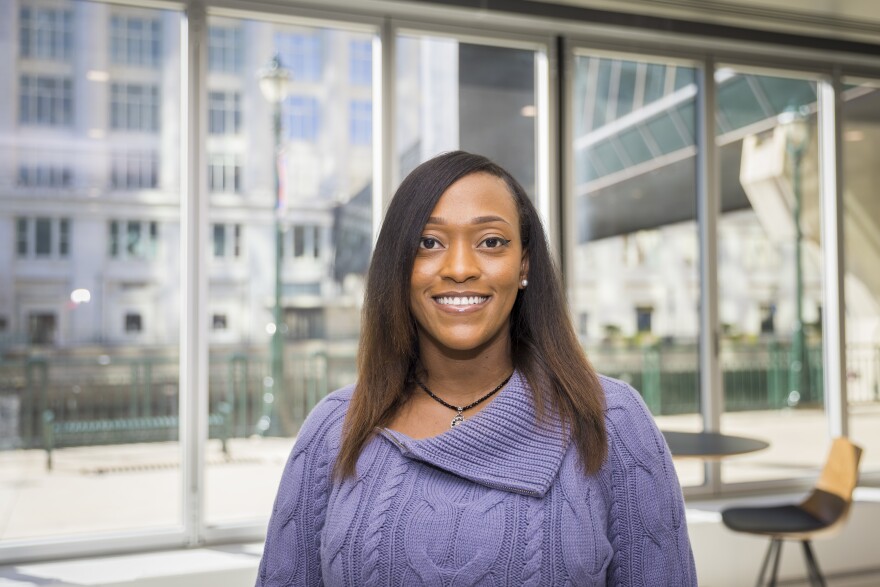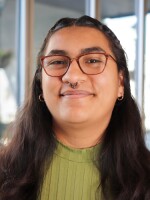WUWM has been serving the Milwaukee area for more than 60 years. Seven years ago, the station introduced the Eric Von Broadcast Fellowship to help the next generation of journalists learn the craft and grow their careers.
WUWM's Teran Powell was the first Eric Von Fellow and has since grown her career as the station's Race & Ethnicity reporter. She also serves as a beloved mentor for the current and incoming fellows of the station.
For this segment of our Get to Know WUWM series, we sat down with Teran to learn more about her approach to mentoring, reporting, and her journey from fellow to beat reporter.
This conversation has been edited for length and clarity.
Going from a fellow at WUWM to a beat reporter, what was that change like? What was some of the adjustments that you had to make?
The fellowship is a lot more general. We operate as general assignment reporters. I won’t say there was any formal transition, and I also don’t have a background in African American studies or, you know, anything that really focused on people of color, their history and place kind of thing. I feel like I was really starting from scratch, essentially.
There was someone who was in the position for a few months before I took over the role, but I feel like even when she had the position, she was kind of figuring it out. By the time I came in, I really had a chance to shape it the way that I wanted to. I would have conversations with Michelle and Ann-Elise about what we wanted this beat to look like and the type of stories we wanted to tell.
I don’t even think I really knew where I wanted to take it though. I just, on a base level, was like: I have to tell Black folks’ stories, I have to tell Hispanic/Latino stories. You’ve got to be on the ground with people, basically. So it was really basic at that level for me. It was just making sure that I have stories — I tell stories where people of color are at the center, where they are the ones telling that story. I’m just there with the mic.
What is it like to be a mentor for incoming journalists when you were previously in that same spot?
So I took over as the main mentor with Kobe Brown. He was our fifth Eric Von Fellow, and I was probably a smidge intimidated by it for the simple fact that I’ve not done a lot of mentorship.
So I think that’s something that’s important to me with, you know, the fellows coming in — I want you to let me know how much you need me, how much I need to fall back, where I can step in. I don’t want to be overbearing, but I want to let you know that if there’s anything you need that I can help with, I am here. And if I’m not the person to answer that question, I can find someone who can.
I guess top of mind for me is just being a support for the fellows, because every fellow comes in at different levels of experience. You have some folks who might have interned at public radio stations or other papers, magazines, things like that. Or you have someone who is quite literally fresh out of undergrad. So you have to meet all the fellows where they are.
I think just being in that support and letting the fellows know that you don’t have to feel like the first day you come in, you’ve got to be up and running.
Do you have any pieces or projects that you've created or produced during your time here at WUWM that you're specifically proud about or you think captures who you are at your core as a journalist?
I talk a lot about young people, and sometimes it doesn’t click for me that I’m in my 30s now. I’m like, “I’m still the young people.” But I like stories where young people are the focal point and they’re talking about what’s going on in their communities and the work they can do at their age to make a change.
Recently, I covered Leaders Igniting Transformation and their Black Hogwarts program. That’s a program helping young folks learn how to be civically engaged, become activists, and make change in their community.
I like to hear from young people in the Black Hogwarts program because elders count young people out — as if they’re not in the midst of all the same craziness we’re experiencing as adults. I think I’ve been able to have them speak in stories about gun violence and talk about how they’re tired of it. They need elected officials to do something where we can see concrete changes and get guns out of the hands of dangerous people, out of the community, decrease accessibility.Gun violence is something that has affected me personally. So I think that’s why I tend to gravitate toward those stories and having young people weigh in — because they’re losing peers and family members, and we need to be talking to them about how that affects them, and again, what they’re going to do, what they are doing to bring attention to that and to make change in their community.



